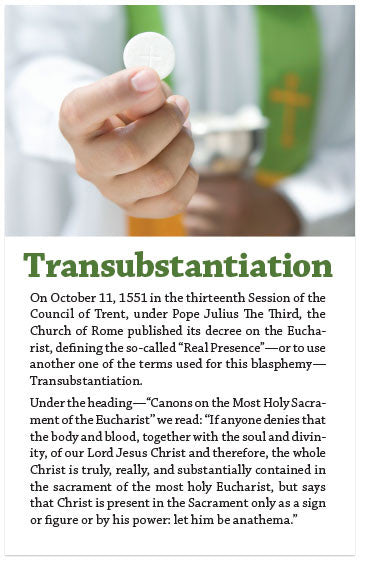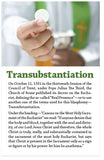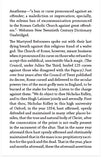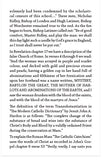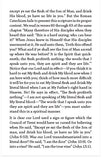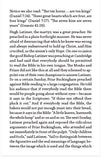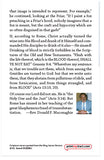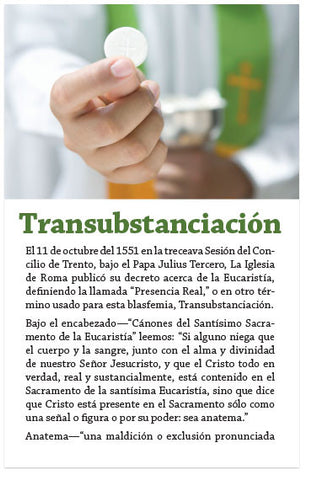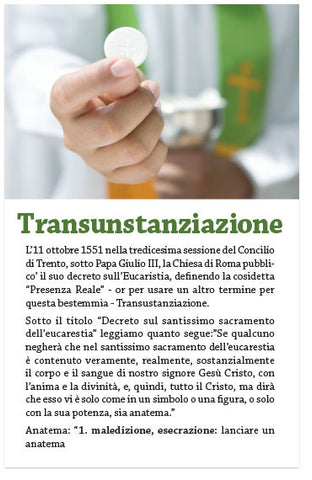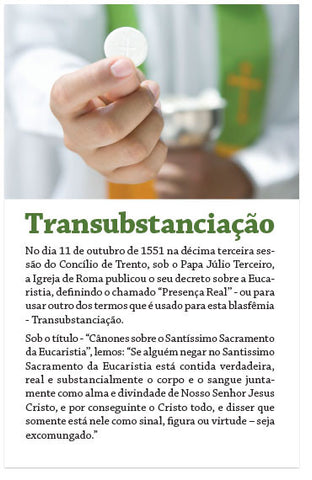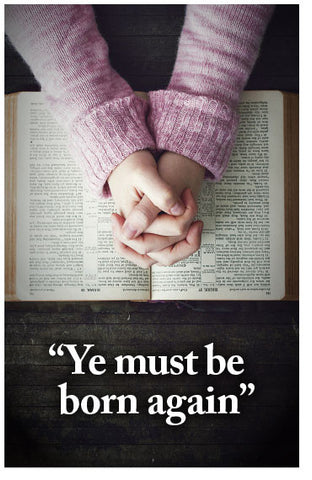Transubstantiation (KJV)
Special-Order Folded Tract
 NOTE: This item is custom-printed to order (click for more details).
NOTE: This item is custom-printed to order (click for more details).
This tract is from our print-on-demand library, and is not kept in stock. Select the options below, and we will custom-print a batch just for you. Because this item is custom-printed, you can add your custom imprint to the back page at no extra cost.
- Estimated shipping date: Monday, January 5 (Click for more details)
- SKU:
- Discounts: Discount coupons do not apply to this item
- Format: Folded Tract
- Size: 3.5 inches x 5.5 inches
- Pages: 6
- Imprinting: Available with 5 lines of custom text
- Version: KJV
- Returns: Because this item is custom-printed to order, it cannot be returned.
Show all item details
The full text of this tract is shown below in the KJV version. (Do you want to print this tract in a different version than the one listed? Contact us and let us know what you're looking for—we may be able to create the alternate version for you at no charge.)
On October 11, 1551 in the thirteenth Session of the Council of Trent, under Pope Julius The Third, the Church of Rome published its decree on the Eucharist, defining the so-called “Real Presence”—or to use another one of the terms used for this blasphemy—Transubstantiation.
Under the heading—“Canons on the Most Holy Sacrament of the Eucharist” we read: “If anyone denies that the body and blood, together with the soul and divinity, of our Lord Jesus Christ and therefore, the whole Christ is truly, really, and substantially contained in the sacrament of the most holy Eucharist, but says that Christ is present in the Sacrament only as a sign or figure or by his power: let him be anathema.”
Anathema—“a ban or curse pronounced against an offender; a malediction or imprecation; specially, the solemn ban of excommunication pronounced in the Roman Catholic Church against great offenders.”- Websters New Twentieth Century Dictionary Unabridged.
The Martyred Reformers spoke out with their last dying breath against this religious fraud of a wafer god. The Church of Rome, however, meant business when it pronounced its curse on those who refused to accept this unbiblical, unscientific black magic. (The Council, under Julius The Third, hurled 125 curses against those who disagreed with the Papacy.) Just over four years after the Council of Trent published its decree, Rome cursed and delivered to the secular powers two of the most godly men in England, to be burned at the stake for heresy. Listen to the charge against them: “We do object to thee Nicholas Ridley, and to thee Hugh Latimer jointly and severally. First that thou, Nicholas Ridley in this high university of Oxford, in the year 1554, hast affirmed, openly defended and maintained in many other places besides, that the true and natural body of Christ, after the consecration of the priest is not really present in the sacrament of the altar. That in the same year aforesaid thou hast openly affirmed and obstinately maintained that in the mass is no propitiatory sacrifice for the quick and the dead. That in the year, place and months aforesaid, these the aforesaid assertions solemnly had been condemned by the scholastical censure of this school….” These men, Nicholas Ridley, Bishop of London and Hugh Latimer, Bishop of Worchester remained true to the end. As the fire began to burn, Bishop Latimer called out: “Be of good comfort, Master Ridley, and play the man: we shall this day light such a candle by God’s grace in England, as I trust shall never be put out.”
In Revelation chapter 17 we have a description of the false Church of Rome. In verses 4 through 6 we read: “And the woman was arrayed in purple and scarlet colour, and decked with gold and precious stones and pearls, having a golden cup in her hand full of abominations and filthiness of her fornication and upon her forehead was a name written, MYSTERY, BABYLON THE GREAT, THE MOTHER OF HARLOTS AND ABOMINATIONS OF THE EARTH, and I saw the woman drunken with the blood of the saints, and with the blood of the martyrs of Jesus.”
The definition of the term Transubstantiation in “The Modern Catholic Dictionary” by Jesuit John A. Hardon is as follows: “The complete change of the substance of bread and wine into the substance of Christ’s Body and Blood by a validly ordained Priest during the consecration at Mass.”
To explain the Roman Mass “The Catholic Catechism” uses the words of Christ as recorded in John’s Gospel chapter 6 verse 53 “Verily, verily, I say unto you except ye eat the flesh of the Son of Man, and drink His blood, ye have no life in you.” But the Roman Catechism fails to present this scripture in its proper context. We read in verses 60 through 63 of the same chapter “Many therefore of His disciples when they heard this said: ‘This is a hard saying; who can hear it?’ When Jesus knew in Himself that His disciples murmured at it, He said unto them, ‘Doth this offend you? What and if ye shall see the Son of Man ascend up where He was before? It is the Spirit that quickeneth; the flesh profiteth nothing: the words that I speak unto you, they are spirit and they are life.’” Notice that our Lord said in effect—If you think it is hard to eat My flesh and drink My blood now when I am here with you; think of how much more difficult it will be for you to eat My literal flesh and drink My literal blood when I am at My Father’s right hand in Heaven. No! He says in effect, “The flesh profiteth nothing”—I am not speaking of My literal flesh and My literal blood—“The words that I speak unto you they are spirit and they are life”—you must understand this in a spiritual manner.
It is clear our Lord used a sign or figure which the Council of Trent would have us cursed for believing when He said, “Except ye eat the flesh of the Son of man, and drink his blood, ye have no life in you” (John 6:53). Was our Lord transubstantiated into a literal door? He said, “I am the door” (John 10:9). Or into a vine? He said, “I am the true vine” (John 15:1). Notice we also read: “The ten horns … are ten kings” (Daniel 7:24). “These great beasts which are four, are four kings” (Daniel 7:17). “The seven kine are seven years” (Genesis 41:26).
Hugh Latimer, the martyr, was a great preacher. He preached in a plain forthright manner. He was never afraid of denouncing that which he knew was wrong and always endeavoured to hold up Christ, and Him crucified, as the sinner’s only Hope. On one occasion the good Bishop Latimer was preaching at Cambridge and had said that everybody should be permitted to read the Bible in his own tongue. The Monks and Friars did not like this at all and they schemed to appoint one of their own champions to answer Latimer. So on a certain Sunday, Friar Buckingham preached against Bible reading to a large congregation. He told his audience that if everybody read the Bible there would be people going about without eyes—because it says in the Scriptures: “If thine eye offend thee pluck it out.” And if everybody read the Bible, the bakers would not put enough yeast into their bread, because it says in the Bible: “A little leaven, leaveneth the whole lump” and so on and so on. The next Sunday, Latimer preached again and exposed the ridiculous arguments of Friar Buckingham, who attended and sat immediately in front of the pulpit. “Only children and fools,” said Latimer, “fail to distinguish between the figurative and the real meanings of language; between the image which is used and the things which that image is intended to represent. For example,” he continued, looking at the Friar, “If I paint a fox preaching in a Friar’s hood, nobody imagines that a fox is meant, but the craft and hypocrisy which are so often disguised in that garb!”
If, according to Rome, Christ actually turned the wine into His Blood and drank of it Himself and commanded His disciples to drink of it also—He sinned! Drinking of blood is strictly forbidden in the Scriptures of the Old and New Testaments. “Flesh with the life thereof, which is the BLOOD thereof, SHALL YE NOT EAT” Genesis 9:4. “Wherefore my sentence is, that we trouble not them, which from among the Gentiles are turned to God: but that we write unto them, that they abstain from pollutions of idols, and from fornication, and from things strangled, and from BLOOD” (Acts 15:19, 20).
Of course our Lord did not sin. He is “the Holy One and the Just” (Acts 3:14). But Rome has sinned in her teaching of the great blasphemous fraud of transubstantiation. —Rev. Donald F. Maconaghie

